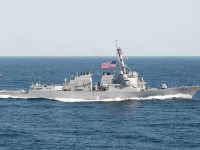Wu Zurong, Research Fellow, China Foundation for Int'l Studies
Mar 30, 2016
Depending on military might to preserve US dominance of the globe is a strategic error on four counts, and that approach is oblivious to both China’s peaceful rise and the real desires of China’s neighbors.
Hu Bo, Director, the South China Sea Strategic Situation Probing Initiative
Mar 29, 2016
With the deployment of advanced weaponry and coupled with extensive media coverage, the US military has put on a show similar to a Hollywood blockbuster. But war is not imminent: The US simply hopes to increase China’s costs for such sovereignty-defending activities through military, political, diplomatic and media tools – and embarrass China diplomatically.
Zhou Bo, Senior Fellow, Center for International Security and Strategy, Tsinghua University
Jan 08, 2016
Despite disorder in the world, China and the US are finding ways to minimize risks with their armed forces, while counter-terrorism and anti-piracy provide new opportunities for cooperation. While the bilateral relationship is intrinsically volatile and competitive, the two militaries have been remarkably adept at finding common protocols, even in contentious areas like the South China Sea.

Richard Weitz, Senior Fellow, Hudson Institute
Nov 13, 2015
Richard Weitz reviews the recent speech of U.S. Defense Secretary Ashton Carter, who describes China’s potential to challenge the U.S.-built international order through its assertive stance in the South China Sea, and finds his approach sensible, given the mixed and fluid strategic relationship between the two countries.

Ben Reynolds, Writer and Foreign Policy Analyst in New York
Nov 13, 2015
In October, the USS Lassen sailed within twelve nautical miles of an artificial Chinese island in the South China Sea as a “freedom of navigation patrol.” Benjamin Reynolds argues that China should not risk a military confrontation by responding to American patrols.

Hu Bo, Director, the South China Sea Strategic Situation Probing Initiative
Nov 12, 2015
US naval actions in the South China Sea are about hegemony and power politics, a prevailing pursuit in the world in the 19th century, under the cloak of a 21st century pretense to safeguard freedom of navigation and international justice. The reality is: The US wants to check any expansion of Chinese power in the South China Sea.

Ted Galen Carpenter, Senior Fellow, Randolph Bourne Institute
Nov 04, 2015
On October 27, the U.S. Navy sent the guided-missile destroyer USS Lassen on a “freedom of navigation” patrol within 12-miles of a man-made islands.in the Spratly chain. Carpenter argues that there are less confrontational ways to pursue that objective without the kind of “in your face” challenge.
Oct 23, 2015
Relations between the Chinese and U.S. navies are their "best in history" and exchanges between the two will become more systematic in the future, China's military on Friday cited the country's naval chief as telling visiting U.S. officers. The comments by navy chief Wu Shengli come as Washington considers conducting freedom-of-navigation operations within 12 nautical miles of artificial islands China has built in the disputed South China Sea, without saying when it would do so. Such a move would likely infuriate Beijing.
Oct 22, 2015
China hosted a visit this week to its sole aircraft carrier by senior U.S. Navy officers amid tensions over reported plans by Washington to challenge Beijing's territorial claims in the South China Sea.
Sep 25, 2015
China and the United States have signed annexes to two agreements regarding major military operations and naval and air force encounters.
Back to Top

- China-US Focus builds trust and understanding between the U.S. and China through open dialogue among thought leaders.
- Our Offerings
- Topics
- Videos
- Podcasts
- Columnists
- Research Reports
- Focus Digest
- Stay Connected
-
Thanks for signing up!
- Get the latest stories from China-US Focus weekly.